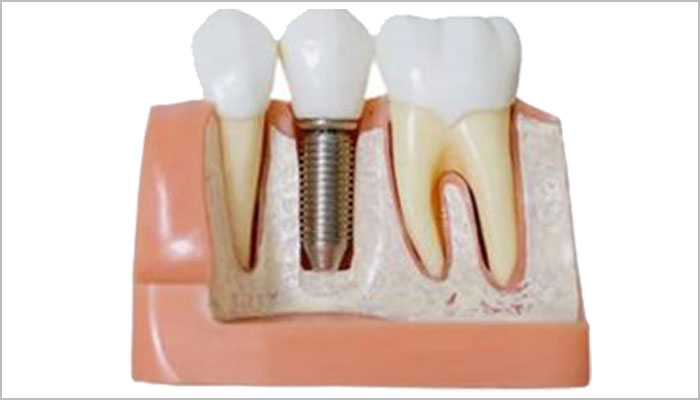How are Dental Implants better than Bridges?
- In this process, the implanted teeth place less pressure on the surrounding teeth and help heal the bone structures and gums under the teeth.
- The implanted teeth also reduce long-term risks posed to the jaw.
- In this procedure, the implanted teeth look and function naturally like the original teeth. They are solid and stable, which keeps your smile confident enough.
- The biggest perk of dental implants is that they can last long if they are of high quality. To stay for a long, they need a little bit of care, like flossing and using Waterpik.
Disadvantages:
- Dental Implants require surgery; therefore, there always remains risk throughout the procedure.
- Dental Implants are a time taking process. It takes multiple months for your implants to heal into your jawbone completely. Bones heal slowly; therefore, it may take at least three months before a dental crown is placed on the implant. In many cases, dentists create temporary crowns until your jawbone heals. And you are ready for your permanent restoration.
Dental Bridges:
- Dental Bridges are false teeth held in place by the teeth around your missing tooth. They are generally made of materials like porcelain or plastic to match your natural tooth color, and they can cover one or multiple missing teeth.
Advantages:
- Dental bridges are an excellent way to restore lost teeth because they provide both a practical and aesthetically pleasing restoration. The teeth allow the person to chew and usually eat, as there is no longer any gap between the teeth.
- Additionally, closing the tooth gap that could affect the tongue's position and the way sounds are produced in the mouth; can help people talk more freely.
- When a dental bridge is precisely matched in color to the neighbouring teeth, it might compensate for losing the original teeth. Patients who are self-conscious about their looks due to missing teeth may benefit from boosting their confidence and self-esteem.
- Many patients prefer bridges because of their easy maintenance; they feel comfortable using them because they feel pretty accustomed to the feel of the dental bridge after it takes the natural shape of the mouth structure. Bridges may be cleaned by brushing, like natural teeth, unlike dentures, which do not need to be taken out regularly for maintenance.
Disadvantages:
- For conventional bridges, healthy teeth must be covered with crowns. There will be some healthy tooth enamel lost during the shaving down and capping of the healthy teeth on either side of the bridge. This raises the possibility of causing already healthy teeth irreparable harm.
- Implants stay a lot longer than bridges. Unlike implants, which are meant to last a lifetime, bridges are not. Bridges may not always be able to remain in place permanently due to the harm they eventually bring to the anchor teeth.
- Bridges don’t correct bone loss in the jaw bone. It sits above the gum line and has no roots, unlike implants with an artificial source fixed to the jaw bone. Therefore, bridges don’t stop bone loss from occurring as implants do.
- It’s a lengthy and costly procedure. It can take a few months to be completed, especially when the jaw bone needs to be strengthened by bone grafting to support the implant. The cost will increase due to the two implants on either side of the bridge, but it will still be less than getting all implants.

